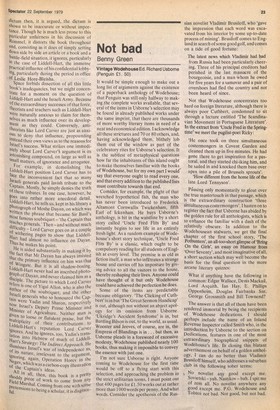Not bad
Benny Green
Vintage Wodehouse Ed. Richard Usborne (Penguin 21 50) It would be simple enough to make out a long list of arguments against the existence of a paperback anthology of Wodehouse; that Penguin was still only halfway to making,the complete works available, that several of the items in Usborne's selection may be found in already published works under the same imprint, that there are thousands of more worthy literary items in need of a neat and economical edition. I acknowledge all these strictures and 70 or 80 others, and, having acknowledged them, blithely lob them out of the window as part of the celebratory rites for Usborne's selection. It is the subtlest of metaphysical questions how far the inhabitants of this island ought to make themselves familiar with the books of Wodehouse, but for my own part I would' say that everyone ought to read every one, and that every addition to the published lists must contribute towards that end. Consider, for example, the plight of that wretched hypothetical fish, the man who has never been introduced to Frederick Altamont Cornwallis Twickenham, fifth Earl of Ickenham. He buys Usborne's anthology, is hit in the waistline by a short story called 'Uncle Fred Flits By' and instantly begins to see life in an entirely fresh light. As a random example of Wodehouse's short story technique, 'Uncle Fred Flits By' is a classic, which ought to be compulsory reading for all students of English at every level. The premise is as old as fiction itself, a man who infiltrates a strange house and carries off his imposture by giving advice to all the visitors to the house, thereby reshaping their lives. Anyone could have thought of it but only Wodehouse could have achieved the perfection he does. Some of the items are predictable because obligatory. 'The Clicking of Cuthbert' is in but 'The Great Sermon Handicap' is out, although not without an abject apology for its omission from Usborne. `Ukridge's Accident Syndrome' is in, but Battling Bilson is out, to the world, as usual. Wooster and Jeeves, of course, are in, the Empress of Blandings is in . . . but then, as Usborne pleads in a foreword of excessive modesty, Wodehouse published nearly 100 books, thus making it impossible to convey the essence with just one.
I'm not sure Usborne is right. Anyone coming to Wodehouse for the first time would be off to a flying start with this selection, and approaching the problem in the strict utilitarian terms, I must point out that 400 pages for £1.50 works out at rather more than 1000 words per penny. And what words. Consider the apotheosis of the Rus sian novelist Vladimir Brusiloff, who 'gave the impression that each word was excavated from his interior by some up-to-date process of mining'. Brusiloff comes to England in search of some good golf, and comes on a tide of good fortune: The latest news which Vladimir had had from Russia had been particularly cheering. Three of his principal creditors had perished in the last massacre of the bourgeoisie, and a man 'Whom he owed for five years for a samovar and a pair of overshoes had fled the country and not • been heard of since.
Not that Wodehouse concentrates too hard on foreign literature, although there is always poor Cuthbert, condemned to sit through a lecture entitled 'The Scandinavian Movement in Portuguese Literature'. In the extract from 'Uncle Fred in the Springtime' we meet the pugilist-poet Ricky: 'He once took on three simultaneous costermongers in Covent Garden and cleaned them up in five minutes. He had gone there to get inspiration for a pastoral, and they started chi-iking him, and he sailed in and knocked them base over apex into a pile of Brussels sprouts'.
'How different from the home life of the late Lord Tennyson'.
Pausing only momentarily to gloat over the true mastertouch in that passage, which is the extraordinary construction 'three simultaneous costermongers', I hasten on to register the fact that Usborne has abided by the golden rule for all anthologists, which is to enhance the familiar with a dash of the relatively obscure. In addition to the Wodehousean stalwarts, we get the final chapter of the first school story, 'The Pothunters', an all-too-short glimpse of 'Bring On the Girls', an essay on Humour from 'Over Seventy', and Most imaginative of all, a short section which may well become the basis for the final question in the more arcane literary quizzes: What if anything have the following in common: Edgar Wallace, Denis Mackail, Lord Asquith, Ian Hay, E. Phillips Oppenheim, Douglas Fairbanks Snr, George Grossmith and Bill Townend?
The answer is that all of them have been rendered immortal by being the recipients of Wodehouse dedications. I should perhaps include the name of an Inland Revenue Inspector called Smith who, in the introduction by Usborne to the section on Dedications, features in one of the most extraordinary biographical snippets of Wodehouse's life. In closing this blatant advertisement on behalf of a golden anthology, I can do no better than Vladimir Brusiloff himself, who addresses a suburban club in the following sober terms: , No novelist any good except me. Sovietski — yah. Nastikov — bah, I spit me of zem all. No novelist anywhere any good except me. P.G. Wodehouse and Tolstoi not bad. Not good, but not bad.


































 Previous page
Previous page